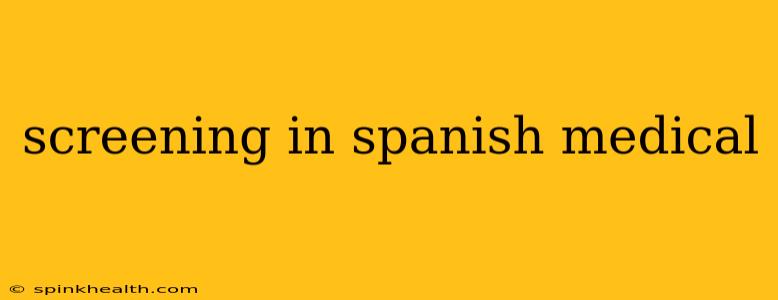Screening in Spanish Medical Contexts: A Comprehensive Guide
The term "screening" in Spanish medical contexts isn't a direct translation. The appropriate word depends heavily on the type of screening being discussed. There's no single perfect equivalent, and understanding the nuance is crucial for accurate communication and effective healthcare. Let's explore this further, addressing some common questions.
¿Qué significa "screening" en medicina en español? (What does "screening" mean in medicine in Spanish?)
This is the central question, and the answer is multifaceted. "Screening" refers to the process of identifying individuals who may have a particular disease or condition but who are not yet showing symptoms. Therefore, the translation needs to reflect the purpose of the screening. Here are some common options, each appropriate in different circumstances:
-
Detección precoz: This translates to "early detection" and is a good general term for many screening procedures, especially those aimed at identifying diseases in their early, often treatable stages. For example, "detección precoz del cáncer de mama" (early detection of breast cancer).
-
Cribaje: This is a more technical term, often used in medical research and professional settings. It's a direct borrowing from French and is gaining traction in Spanish medical literature.
-
Tamizaje: This word is gaining popularity and is often used interchangeably with "detección precoz". It emphasizes the systematic nature of the screening process.
-
Examen de detección: This translates to "screening exam" and is a straightforward and easily understood option.
¿Cuáles son los diferentes tipos de exámenes de detección? (What are the different types of screening exams?)
The types of screening vary widely depending on the disease or condition. Some examples include:
-
Cáncer: Screening for various cancers, such as breast cancer (cribado de cáncer de mama), cervical cancer (cribado de cáncer cervical), colon cancer (cribado de cáncer de colon), and prostate cancer (cribado de cáncer de próstata) uses different methods like mammography, Pap smears, colonoscopies, and PSA tests respectively.
-
Enfermedades cardíacas: Cardiac risk assessments often involve blood pressure checks, cholesterol testing, and family history evaluations. The Spanish equivalent might be evaluación del riesgo cardiovascular.
-
Enfermedades genéticas: Genetic screening looks for specific genes linked to hereditary conditions. The translation depends on the context, but pruebas genéticas de detección is often suitable.
-
Enfermedades infecciosas: Screening for infectious diseases like HIV or Hepatitis uses blood tests, and the term pruebas de detección works well.
¿Qué tan efectivo es el screening? (How effective is screening?)
The effectiveness of screening depends greatly on the specific disease, the screening method used, and the population being screened. Some screenings are highly effective at reducing mortality and morbidity, while others have limitations. It's essential to consult with a healthcare professional to understand the benefits and risks of any particular screening test. This information is usually available in studies and through medical associations.
¿Quién debería hacerse un screening? (Who should get screened?)
Screening recommendations vary widely by age, gender, family history, and risk factors. Healthcare professionals use guidelines to determine who should undergo screening and when. It's vital to discuss your personal risk factors with your doctor to determine if and when you should be screened. These guidelines are often published by health organizations.
¿Cuáles son los riesgos asociados con el screening? (What are the risks associated with screening?)
While screening can save lives, it does carry potential risks, including:
- Falsos positivos: These results indicate a problem when none exists, causing unnecessary anxiety and further testing.
- Falsos negativos: These results miss a real problem, leading to delayed diagnosis and treatment.
- Riesgos asociados con la prueba en sí: Some screening tests, like colonoscopies, carry minor risks of complications.
It's crucial to weigh the potential benefits against these risks when deciding whether to undergo screening.
This comprehensive guide provides a starting point for understanding "screening" in Spanish medical contexts. Remember to always consult with a healthcare professional for personalized advice. The correct terminology and appropriate screening procedures are crucial for effective healthcare.

